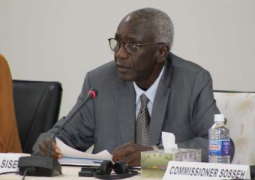
There can be no doubt that the more crucial the position of an individual in society, the deeper is his need for public trust and confidence. Now can any position be graver and carry more responsibility than that of the Prophet who is to guide society, exercising his guidance in all affairs of life, both spiritual and material? The supreme purpose and aim of the mission of God’s Messengers is to guide and educate human beings across the world by means of a series of Divine teachings and ordinances. It is, at the same time the religious duty of mankind to submit to all the sublime injunctions of religion that the Prophet has presented as revelation and Divine law. Naturally, humans will implement those teachings with all their heart and soul and accord absolute value to them only when they are thoroughly convinced that those teachings do indeed emanate from the source of all being. What authority or person can earn such universal trust that whatever he says will earn sincere and unquestioning acceptance so that human beings submit to his commands? Can anyone deserve that trust unless he is armed with the weapon of inerrancy and virtue is manifest in him in all its dimensions?
Were it not possible to trust completely a Messenger of God in his receiving and conveying the revelation, the aim of prophethood which is the perfection of humanity could not be ensured; were the Prophets to lack inerrancy in conveying the Commands of God, society would inevitably deviate from its true course. Were the Prophets not to be protected from pollution by sin and infection by moral disease, and were they not to gain immunity from all kinds of impurity, the possibility would always exist that they would stumble when confronted with the deceptive allure of the material world and pursue personal goals such as wealth and power. This would be true even if they had lofty human attributes to a superior degree. It is obvious that the existence of such a possibility would cause their followers to hesitate before implementing the commands and pronouncements. The one who claims prophethood and the right to lead human beings, whom human beings must follow in order to attain the pinnacle of perfection in all aspects of their life-if such a one were to have the slightest record of deviance, dishonesty and inclination to sin, could it be totally excluded that he would never again life, betray or speak an untruth? Could he be accepted as a model of virtue and purity? Without doubt, intelligence and logic compel us to answer this question in the negative. No one could accept with complete confidence as revelation and the Command of God the words of someone whose life did not shine with purity, who had fallen into the whirlpool of sin and openly engaged in corruption and moral turpitude before claiming prophethood, even though later a spiritual revolution and transformation had occurred in him. No one could accept his teachings as an unquestionable message from heaven, particularly with regard to matters that lie beyond the experience of the human being. The Prophets must also be completely removed from anything that causes doubt to arise or impairs the completeness of God’s proof. The Quran proclaims: “Before this, you were unable to read or to write; this was lest the deniers should doubt concerning your prophethood.” (29:47) “Say: God’s is the best and most eloquent proof.” (10:47) “We sent the Prophets as givers of glad tidings and warnings so that no excuse should remain thereafter for human beings.” (4:165)
Therefore the first necessary condition for the appearance of revelation is the absolute sincerity and inner purity of the Prophets. The burning love of human beings for the Prophets and their devotion to them which arises from the deepest layers of their inner being as well as their belief in absolute values, in God, and the guardians of religion-all of this is made possible by the inerrancy and perfection of those Divinely guided personages. The effectiveness of conduct and mode of action is infinitely greater than that of mere words. The behavior and attributes of a teacher plays a fundamental role in the instruction of those for whom he is responsible, action having a far –reaching effect in building the character of an individual that cannot in any way be compared with the effect of speech. It will be a disaster for humanity if the one who assumes a lofty position of spiritual guidance in society is himself immersed in a whirlpool of pollution and evil. If he lacks true awareness and piety, can he create an appropriate environment for the fostering of virtue and can he bring about an inward transformation and revolution in the human being that will have a lasting effect? Will he have the capacity to train human beings and be their moral guide? Can he implant piety and virtue in their minds and their thoughts?
The commission of even a single sin by the Prophets would render fruitless their attempts at nurturing human beings to attain perfection, which is the goal of their mission. How can one who is himself polluted with sin purify others of their sins? One who is not himself morally and spiritually perfect cannot possibly succeed in training human beings to perfection. We cannot take into consideration only the deeds and conduct of the Prophets during the period of their mission, and treat them separately from the spiritual and ethical characteristics they display during the rest of their lives. A more comprehensive investigation must be carried, for it is not enough that Prophets turn to purity only at the beginning of their missions. The firm and continuous link of the Prophets with the source of existence and the complete absence of pollution by sin throughout all of their lives constitute an absolute necessity. Divinely guided personalities must never have been polluted by sin. Any prior record of sin on their part will form a great obstacle in the path of their heavenly mission which is to guide human beings to God and call them to purity and the avoidance of all abomination. One who until yesterday stood in the ranks of the impure, those polluted by corruption, and who devoted a whole segment of his life to sin, will inevitably have his evil record remembered by others; it will be vividly present in their minds, and they cannot overlook it as they analyze and sit in judgment on his past life. The beginning of a profound spiritual transformation cannot by itself wash away all previous corruption and remove it from the minds of human beings. When studying the histories of the Prophets, one should never content oneself with a superficial listing of events. The perceptive researcher must investigate all the different dimensions of the lives of the Prophets before their assumption of the prophethood. Then only will they be able to understand why the obstinate sworn enemies of the Prophets, in their conspiratorial efforts to prevent the dissemination of the heavenly message, do not shrink even from attributing madness to the Prophets, but never dare to accuse them of moral corruption
To be continued
Read Other Articles In Article (Archive)
GOOD MORNING MR. PRESIDENT: Gambia- Senegal relationship
Feb 24, 2020, 12:28 PM




